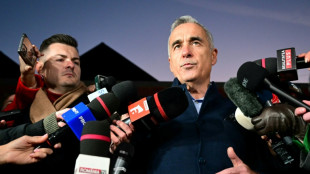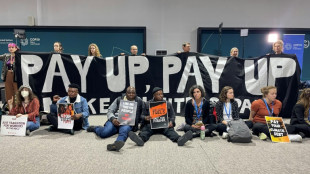
-
 Canada watchdog sues Google over 'anti-competitive' ad tech
Canada watchdog sues Google over 'anti-competitive' ad tech
-
Hojlund gives Amorim winning Old Trafford bow, Roma hold Spurs

-
 Amorim wins first Man Utd home game after rollercoaster ride
Amorim wins first Man Utd home game after rollercoaster ride
-
France arrests 26 as South Asian migrant trafficking ring smashed

-
 At least 15 dead, 113 missing, in Uganda landslides
At least 15 dead, 113 missing, in Uganda landslides
-
Netanyahu threatens 'intensive war' if Hezbollah breaches fragile truce

-
 Bilbao join Lazio at Europa League summit, Chelsea cruise in Conference League
Bilbao join Lazio at Europa League summit, Chelsea cruise in Conference League
-
In Lebanon's Tyre returning residents find no water, little power

-
 Protests in Georgia after PM delays EU bid to 2028
Protests in Georgia after PM delays EU bid to 2028
-
Biden slams Trump tariff threats as 'counterproductive'

-
 TikTok tactics shake up politics in Romania
TikTok tactics shake up politics in Romania
-
'He should do comedy' says Norris of Verstappen comments

-
 Americans celebrate Thanksgiving after bitter election
Americans celebrate Thanksgiving after bitter election
-
Flood-hit Spain introduces 'climate leave' for workers

-
 UK's Starmer vows to slash net migration
UK's Starmer vows to slash net migration
-
Recount order, TikTok claims throw Romania election into chaos

-
 Jansen stars for South Africa as Sri Lanka crumble to 42 all out
Jansen stars for South Africa as Sri Lanka crumble to 42 all out
-
Bottas set for Mercedes return as Mick Schumacher quits reserve role

-
 Putin threatens Kyiv with new hypersonic missile
Putin threatens Kyiv with new hypersonic missile
-
Georgia delays EU bid until 2028 amid post-election crisis

-
 French PM announces concession in bid to end budget standoff
French PM announces concession in bid to end budget standoff
-
Guardiola's ingenuity will solve Man City crisis, says Slot

-
 South Africa in control after Sri Lanka crash to 42 all out
South Africa in control after Sri Lanka crash to 42 all out
-
'Nothing left': Flood-hit Spanish town struggles one month on

-
 Israel conducts first strike on Lebanon since ceasefire
Israel conducts first strike on Lebanon since ceasefire
-
'Unrecognisable' Mbappe and Real Madrid hurting after European woes

-
 Uber and Bolt unveil women-only service in Paris
Uber and Bolt unveil women-only service in Paris
-
French cognac workers protest China bottling plan amid tariff threat

-
 World tennis No.2 Swiatek accepts one-month doping suspension
World tennis No.2 Swiatek accepts one-month doping suspension
-
Suaalii to start for Wallabies against Ireland

-
 Farrell backs youngster Prendergast at fly-half for Aussie Test
Farrell backs youngster Prendergast at fly-half for Aussie Test
-
Suualii to start for Wallabies against Ireland

-
 Camavinga joins Real Madrid injury list
Camavinga joins Real Madrid injury list
-
Australia passes landmark social media ban for under 16s

-
 Nigerian president woos French investment on state visit
Nigerian president woos French investment on state visit
-
Contentious COP29 deal casts doubt over climate plans

-
 PSG, Real Madrid toil as giants struggle to get to grips with new Champions League
PSG, Real Madrid toil as giants struggle to get to grips with new Champions League
-
Lampard appointed manager of 'ambitious' Coventry

-
 Liberian ex-warlord Prince Johnson dies aged 72
Liberian ex-warlord Prince Johnson dies aged 72
-
K-pop band NewJeans leaves label over 'mistreatment'

-
 Sri Lanka crash to record low Test total of 42 in South Africa
Sri Lanka crash to record low Test total of 42 in South Africa
-
Putin says barrage 'response' to West-supplied missiles

-
 Lebanon MPs seek end to leadership vacuum with January presidency vote
Lebanon MPs seek end to leadership vacuum with January presidency vote
-
Eurozone stocks lift as French political stand-off eases

-
 French farmers wall off public buildings in protest over regulations
French farmers wall off public buildings in protest over regulations
-
France says ready for budget concessions to avert 'storm'

-
 Lampard appointed Coventry manager
Lampard appointed Coventry manager
-
French luxury mogul Arnault defiant at ex-spy chief trial

-
 South Africa bowled out for 191 against Sri Lanka
South Africa bowled out for 191 against Sri Lanka
-
'Europe's best' Liverpool aim to pile pain on Man City


Has blockchain found a use beyond crypto trading?
The bitcoin boom spawned new billionaires and videos of beach parties and Lamborghinis. The crypto crash brought devastation for small investors and bankruptcy for many companies.
Blockchain technology underpins crypto and has been hailed as a world-changing innovation, but does it have any use beyond creating speculative financial instruments?
AFP asked crypto critic Stephen Diehl, author of recently published "Popping the Crypto Bubble", to run the rule over some of the most popular claims made for blockchain technology.
- More secure voting? -
As tension and confusion engulfed the United States after the 2020 election, Changpeng Zhao, billionaire founder of crypto firm Binance, had a suggestion.
A "blockchain-based mobile voting app", he tweeted, would mean "we won't have to wait for results, or have any questions on its validity".
Fellow crypto billionaire Vitalik Buterin replied that there were "significant challenges" but he thought it was "directionally 100 percent correct".
So far, experiments have been very small scale.
For Diehl, blockchain was more likely to introduce problems than solve them.
"From the American perspective, every single district runs its own voting programme," said.
"This is seen as a feature because to corrupt any one election you would have to corrupt many, many civil servants.
"Centralising the voting system in one digital place would be pretty risky -– then all you have to do is corrupt the blockchain and you could corrupt democracy."
- Automated house buying? -
Blockchain at heart is a ledger, a way of storing transactions that is -- according to fans -- secure, transparent and permanent.
Those qualities have led countless enthusiasts to propose that the technology could in effect replace paper contracts for things like house buying.
Diehl said it was "absurd" that the blockchain was "going back to things that were solved a millennium ago to justify its own existence".
"This is the system we've had since the Middle Ages -– you have a government registry of land, a title and deed that get transferred when the ownership changes," he said.
"The blockchain isn't solving anything here."
- Payments without banks? -
The blockchain emerged from a 2008 white paper on bitcoin, which was conceived as an alternative to fiat currency.
The opening line reads: "A purely peer-to-peer version of electronic cash would allow online payments to be sent directly from one party to another without going through a financial institution."
Bitcoin was the first cryptocurrency. There are now more than 10,000 others sitting on many different blockchains.
Big firms have been desperate to find ways to accept payments in crypto.
Diehl pointed out that cryptoassets are speculative instruments not suitable for payments.
"When was the last time you paid for your coffee with Apple stocks," he asked.
"It just doesn't happen. You want something that's going to be stable so the price of your coffee is the price of your coffee next week."
- Supply chain tracking? -
Want to know where your mango came from? Some supermarkets believe the best way for you to find out is to access a blockchain-based system capable of tracking the fruit from the tropics of Central America to your cornerstore.
Walmart and Carrefour are among the firms trumpeting blockchain systems.
Carrefour told AFP earlier this year that shoppers would be able to scan a QR code and discover the provenance of an array of products.
The shops hope the blockchain will provide security, certainty and transparency.
Diehl pointed out that digital supply chain management has been around for years and is perfectly adequate without blockchain.
"Blockchain is not adding any incorruptability to the system," he said, pointing out that people in the supply chain could tell lies on the blockchain as easily as on any other platform.
"If I have a carton of apples and report that I put 100 percent of them on the truck, but then I skim off 50 percent for myself, the blockchain is not going to prevent that."
O.Lorenz--BTB
